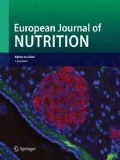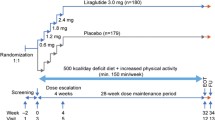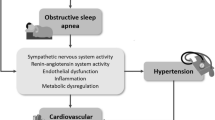Abstract
Purpose
Inflammation and oxidative stress are implicated in obstructive sleep apnea (OSA) pathophysiology. We aimed at exploring whether the combination of a weight-loss Mediterranean diet/lifestyle intervention with OSA standard care, i.e., continuous positive airway pressure (CPAP) prescription, can lead to greater improvements in inflammation and oxidative stress, compared to standard care alone.
Methods
This was a randomized controlled clinical trial in 187 adult, overweight patients with moderate-to-severe OSA. Participants were randomized to a standard care (SCG, n = 65), a Mediterranean diet (MDG, n = 62) or a Mediterranean lifestyle group (MLG, n = 60). All groups received OSA standard care. Intervention arms participated in a 6-month behavioral weight-loss intervention based on the Mediterranean diet, while the MLG also received counselling on physical activity and sleep habits.
Results
Seven patients were excluded and 53/180 were lost to follow-up. In intention to treat analysis (n = 180), the SCG did not exhibit changes in any of the markers assessed. Post-intervention age-, sex-, baseline- and CPAP use-adjusted plasma high sensitivity C-reactive protein levels (mg/L) were lower in the MDG and the MLG compared to the SCG (mean difference − 1.33, P = 0.039 and − 1.68, P = 0.007, respectively). The MLG also exhibited lower urinary 8-iso prostaglandin F2a levels (ng/mg creatinine) compared to the SCG and the MDG (mean difference − 1.10, P < 0.0001 and − 0.80, P = 0.001, respectively). Adiponectin and oxidized guanine levels were not altered in any of the study groups. Results were similar in per protocol analysis (n = 127).
Conclusion
A weight-loss Mediterranean diet/lifestyle intervention on top of CPAP has anti-inflammatory and antioxidant benefits in OSA.
Registration
The trial was prospectively registered at ClinicalTrials.gov (NCT02515357) on August 4, 2015.

Similar content being viewed by others
Data availability
Data are available from the authors on request.
References
Greenstone M, Hack M (2014) Obstructive sleep apnoea. BMJ 348:g3745. https://doi.org/10.1136/bmj.g3745
Carneiro G, Zanella MT (2018) Obesity metabolic and hormonal disorders associated with obstructive sleep apnea and their impact on the risk of cardiovascular events. Metabolism 84:76–84. https://doi.org/10.1016/j.metabol.2018.03.008
Unnikrishnan D, Jun J, Polotsky V (2015) Inflammation in sleep apnea: an update. Rev Endocr Metab Disord 16(1):25–34. https://doi.org/10.1007/s11154-014-9304-x
Lavie L (2015) Oxidative stress in obstructive sleep apnea and intermittent hypoxia—revisited—the bad ugly and good: implications to the heart and brain. Sleep Med Rev 20:27–45. https://doi.org/10.1016/j.smrv.2014.07.003
Farr OM, Mantzoros CS (2017) Sleep apnea in relation to metabolism: an urgent need to study underlying mechanisms and to develop novel treatments for this unmet clinical need. Metabolism 69:207–210. https://doi.org/10.1016/j.metabol.2017.01.028
Lenfant C (2006) The interdependence of sleep and health—a commentary. Metabolism 55(10 Suppl 2):50–53. https://doi.org/10.1016/j.metabol.2006.07.014
Gozal D, Kheirandish-Gozal L (2008) Cardiovascular morbidity in obstructive sleep apnea: oxidative stress, inflammation, and much more. Am J Respir Crit Care Med 177(4):369–375. https://doi.org/10.1164/rccm.200608-1190PP
Zhang H, Yang F, Guo Y, Wang L, Fang F, Wu H, Nie S, Wang Y, Fung ML, Huang Y, Deng H, Qin Y, Ma X, Wei Y (2018) The contribution of chronic intermittent hypoxia to OSAHS: From the perspective of serum extracellular microvesicle proteins. Metabolism 85:97–108. https://doi.org/10.1016/j.metabol.2018.02.012
Vgontzas AN, Gaines J, Ryan S, McNicholas WT (2016) CrossTalk proposal: metabolic syndrome causes sleep apnoea. J Physiol 594(17):4687–4690. https://doi.org/10.1113/JP272114
Epstein LJ, Kristo D, Strollo PJ Jr, Friedman N, Malhotra A, Patil SP, Ramar K, Rogers R, Schwab RJ, Weaver EM, Weinstein MD, Adult Obstructive Sleep Apnea Task Force of the American Academy of Sleep Medicine (2009) Clinical guideline for the evaluation, management and long-term care of obstructive sleep apnea in adults. J Clin Sleep Med 5(3):263–276
Jullian-Desayes I, Joyeux-Faure M, Tamisier R, Launois S, Borel AL, Levy P, Pepin JL (2015) Impact of obstructive sleep apnea treatment by continuous positive airway pressure on cardiometabolic biomarkers: a systematic review from sham CPAP randomized controlled trials. Sleep Med Rev 21:23–38. https://doi.org/10.1016/j.smrv.2014.07.004
Vetrani C, Costabile G, Di Marino L, Rivellese AA (2013) Nutrition and oxidative stress: a systematic review of human studies. Int J Food Sci Nutr 64(3):312–326. https://doi.org/10.3109/09637486.2012.738651
Galland L (2010) Diet and inflammation. Nutr Clin Pract 25(6):634–640. https://doi.org/10.1177/0884533610385703
Thomasouli MA, Brady EM, Davies MJ, Hall AP, Khunti K, Morris DH, Gray LJ (2013) The impact of diet and lifestyle management strategies for obstructive sleep apnoea in adults: a systematic review and meta-analysis of randomised controlled trials. Sleep Breath 17(3):925–935. https://doi.org/10.1007/s11325-013-0806-7
Araghi MH, Chen YF, Jagielski A, Choudhury S, Banerjee D, Hussain S, Thomas GN, Taheri S (2013) Effectiveness of lifestyle interventions on obstructive sleep apnea (OSA): systematic review and meta-analysis. Sleep 36(10):1553–1562. https://doi.org/10.5665/sleep.3056 (1562A–1562E)
Mitchell LJ, Davidson ZE, Bonham M, O’Driscoll DM, Hamilton GS, Truby H (2014) Weight loss from lifestyle interventions and severity of sleep apnoea: a systematic review and meta-analysis. Sleep Med 15(10):1173–1183. https://doi.org/10.1016/j.sleep.2014.05.012
Xanthopoulos MS, Berkowitz RI, Tapia IE (2018) Effects of obesity therapies on sleep disorders. Metabolism 84:109–117. https://doi.org/10.1016/j.metabol.2018.01.022
Chirinos JA, Gurubhagavatula I, Teff K, Rader DJ, Wadden TA, Townsend R, Foster GD, Maislin G, Saif H, Broderick P, Chittams J, Hanlon AL, Pack AI (2014) CPAP, weight loss, or both for obstructive sleep apnea. N Engl J Med 370(24):2265–2275. https://doi.org/10.1056/NEJMoa1306187
Papandreou C, Schiza SE, Tzatzarakis MN, Kavalakis M, Hatzis CM, Tsatsakis AM, Kafatos AG, Siafakas NM, Tzanakis NE (2012) Effect of Mediterranean diet on lipid peroxidation marker TBARS in obese patients with OSAHS under CPAP treatment: a randomised trial. Sleep Breath 16(3):873–879. https://doi.org/10.1007/s11325-011-0589-7
Barnes M, Goldsworthy UR, Cary BA, Hill CJ (2009) A diet and exercise program to improve clinical outcomes in patients with obstructive sleep apnea—a feasibility study. J Clin Sleep Med 5(5):409–415
Kuna ST, Reboussin DM, Borradaile KE, Sanders MH, Millman RP, Zammit G, Newman AB, Wadden TA, Jakicic JM, Wing RR, Pi-Sunyer FX, Foster GD, Sleep ARGotLARG (2013) Long-term effect of weight loss on obstructive sleep apnea severity in obese patients with type 2 diabetes. Sleep 36(5):641-649A. https://doi.org/10.5665/sleep.2618
Georgoulis M, Yiannakouris N, Kechribari I, Lamprou K, Perraki E, Vagiakis E, Kontogianni MD (2020) Cardiometabolic benefits of a weight-loss Mediterranean diet/lifestyle intervention in patients with obstructive sleep apnea: the “MIMOSA” randomized clinical trial. Nutrients. https://doi.org/10.3390/nu12061570
Georgoulis M, Yiannakouris N, Kechribari I, Lamprou K, Perraki E, Vagiakis E, Kontogianni MD (2021) The effectiveness of a weight-loss Mediterranean diet/lifestyle intervention in the management of obstructive sleep apnea: results of the “MIMOSA” randomized clinical trial. Clin Nutr 40(3):850–859. https://doi.org/10.1016/j.clnu.2020.08.037
Han B, Enas NH, McEntegart D (2009) Randomization by minimization for unbalanced treatment allocation. Stat Med 28(27):3329–3346. https://doi.org/10.1002/sim.3710
Bach-Faig A, Berry EM, Lairon D, Reguant J, Trichopoulou A, Dernini S, Medina FX, Battino M, Belahsen R, Miranda G, Serra-Majem L, Mediterranean Diet Foundation Expert Group (2011) Mediterranean diet pyramid today. Science and cultural updates. Public Health Nutr 14(12A):2274–2284. https://doi.org/10.1017/S1368980011002515
Sofi F (2009) The Mediterranean diet revisited: evidence of its effectiveness grows. Curr Opin Cardiol 24(5):442–446. https://doi.org/10.1097/HCO.0b013e32832f056e
World Health Organization (2010) Global recommendations on physical activity for health. World Health Organization, Geneva
Watson NF, Badr MS, Belenky G, Bliwise DL, Buxton OM, Buysse D, Dinges DF, Gangwisch J, Grandner MA, Kushida C, Malhotra RK, Martin JL, Patel SR, Quan SF, Tasali E (2015) Recommended amount of sleep for a healthy adult: a joint consensus statement of the American academy of sleep medicine and sleep research society. Sleep 38(6):843–844. https://doi.org/10.5665/sleep.4716
Wadden TA, Webb VL, Moran CH, Bailer BA (2012) Lifestyle modification for obesity: new developments in diet, physical activity, and behavior therapy. Circulation 125(9):1157–1170. https://doi.org/10.1161/CIRCULATIONAHA.111.039453
Wadden TA, Butryn ML, Wilson C (2007) Lifestyle modification for the management of obesity. Gastroenterology 132(6):2226–2238. https://doi.org/10.1053/j.gastro.2007.03.051
Wadden TA, Foster GD (2000) Behavioral treatment of obesity. Med Clin North Am 84(2):441–461, vii. https://doi.org/10.1016/s0025-7125(05)70230-3
Bountziouka V, Bathrellou E, Giotopoulou A, Katsagoni C, Bonou M, Vallianou N, Barbetseas J, Avgerinos PC, Panagiotakos DB (2012) Development, repeatability and validity regarding energy and macronutrient intake of a semi-quantitative food frequency questionnaire: methodological considerations. Nutr Metab Cardiovasc Dis 22(8):659–667. https://doi.org/10.1016/j.numecd.2010.10.015
Panagiotakos DB, Pitsavos C, Arvaniti F, Stefanadis C (2007) Adherence to the Mediterranean food pattern predicts the prevalence of hypertension, hypercholesterolemia, diabetes and obesity, among healthy adults; the accuracy of the MedDietScore. Prev Med 44(4):335–340. https://doi.org/10.1016/j.ypmed.2006.12.009
Papathanasiou G, Georgoudis G, Georgakopoulos D, Katsouras C, Kalfakakou V, Evangelou A (2010) Criterion-related validity of the short international physical activity questionnaire against exercise capacity in young adults. Eur J Cardiovasc Prev Rehabil 17(4):380–386. https://doi.org/10.1097/HJR.0b013e328333ede6
Little RJ, D’Agostino R, Cohen ML, Dickersin K, Emerson SS, Farrar JT, Frangakis C, Hogan JW, Molenberghs G, Murphy SA, Neaton JD, Rotnitzky A, Scharfstein D, Shih WJ, Siegel JP, Stern H (2012) The prevention and treatment of missing data in clinical trials. N Engl J Med 367(14):1355–1360. https://doi.org/10.1056/NEJMsr1203730
Drager LF, McEvoy RD, Barbe F, Lorenzi-Filho G, Redline S, Initiative I (2017) Sleep apnea and cardiovascular disease: lessons from recent trials and need for team science. Circulation 136(19):1840–1850. https://doi.org/10.1161/CIRCULATIONAHA.117.029400
Bianchi VE (2018) Weight loss is a critical factor to reduce inflammation. Clin Nutr ESPEN 28:21–35. https://doi.org/10.1016/j.clnesp.2018.08.007
Kelesidis I, Kelesidis T, Mantzoros CS (2006) Adiponectin and cancer: a systematic review. Br J Cancer 94(9):1221–1225. https://doi.org/10.1038/sj.bjc.6603051
Katsiki N, Mantzoros C, Mikhailidis DP (2017) Adiponectin, lipids and atherosclerosis. Curr Opin Lipidol 28(4):347–354. https://doi.org/10.1097/MOL.0000000000000431
Yannakoulia M, Yiannakouris N, Melistas L, Fappa E, Vidra N, Kontogianni MD, Mantzoros CS (2008) Dietary factors associated with plasma high molecular weight and total adiponectin levels in apparently healthy women. Eur J Endocrinol 159(4):R5-10. https://doi.org/10.1530/EJE-08-0331
Williams CJ, Fargnoli JL, Hwang JJ, van Dam RM, Blackburn GL, Hu FB, Mantzoros CS (2008) Coffee consumption is associated with higher plasma adiponectin concentrations in women with or without type 2 diabetes: a prospective cohort study. Diabetes Care 31(3):504–507. https://doi.org/10.2337/dc07-1952
Fargnoli JL, Fung TT, Olenczuk DM, Chamberland JP, Hu FB, Mantzoros CS (2008) Adherence to healthy eating patterns is associated with higher circulating total and high-molecular-weight adiponectin and lower resistin concentrations in women from the Nurses’ health study. Am J Clin Nutr 88(5):1213–1224. https://doi.org/10.3945/ajcn.2008.26480
Mantzoros CS, Williams CJ, Manson JE, Meigs JB, Hu FB (2006) Adherence to the Mediterranean dietary pattern is positively associated with plasma adiponectin concentrations in diabetic women. Am J Clin Nutr 84(2):328–335. https://doi.org/10.1093/ajcn/84.1.328
Qi L, Rimm E, Liu S, Rifai N, Hu FB (2005) Dietary glycemic index, glycemic load, cereal fiber, and plasma adiponectin concentration in diabetic men. Diabetes Care 28(5):1022–1028. https://doi.org/10.2337/diacare.28.5.1022
Fragopoulou E, Panagiotakos DB, Pitsavos C, Tampourlou M, Chrysohoou C, Nomikos T, Antonopoulou S, Stefanadis C (2010) The association between adherence to the Mediterranean diet and adiponectin levels among healthy adults: the ATTICA study. J Nutr Biochem 21(4):285–289. https://doi.org/10.1016/j.jnutbio.2008.12.013
Kim SM, Cho GJ, Yannakoulia M, Hwang TG, Kim IH, Park EK, Mantzoros CS (2011) Lifestyle modification increases circulating adiponectin concentrations but does not change vaspin concentrations. Metabolism 60(9):1294–1299. https://doi.org/10.1016/j.metabol.2011.01.013
Esposito K, Pontillo A, Di Palo C, Giugliano G, Masella M, Marfella R, Giugliano D (2003) Effect of weight loss and lifestyle changes on vascular inflammatory markers in obese women: a randomized trial. JAMA 289(14):1799–1804. https://doi.org/10.1001/jama.289.14.1799
Park TG, Hong HR, Lee J, Kang HS (2007) Lifestyle plus exercise intervention improves metabolic syndrome markers without change in adiponectin in obese girls. Ann Nutr Metab 51(3):197–203. https://doi.org/10.1159/000104137
Corpeleijn E, Feskens EJ, Jansen EH, Mensink M, Saris WH, Blaak EE (2007) Lifestyle intervention and adipokine levels in subjects at high risk for type 2 diabetes: the study on lifestyle intervention and impaired glucose tolerance Maastricht (SLIM). Diabetes Care 30(12):3125–3127. https://doi.org/10.2337/dc07-0457
Lee S, Kwak HB (2014) Effects of interventions on adiponectin and adiponectin receptors. J Exerc Rehabil 10(2):60–68. https://doi.org/10.12965/jer.140104
van’t Erve TJ (2018) Strategies to decrease oxidative stress biomarker levels in human medical conditions: a meta-analysis on 8-iso-prostaglandin F2alpha. Redox Biol 17:284–296. https://doi.org/10.1016/j.redox.2018.05.003
Czerska M, Zielinski M, Gromadzinska J (2016) Isoprostanes—a novel major group of oxidative stress markers. Int J Occup Med Environ Health 29(2):179–190. https://doi.org/10.13075/ijomeh.1896.00596
Montuschi P, Barnes PJ, Roberts LJ 2nd (2004) Isoprostanes: markers and mediators of oxidative stress. FASEB J 18(15):1791–1800. https://doi.org/10.1096/fj.04-2330rev
Graille M, Wild P, Sauvain JJ, Hemmendinger M, Canu IG, Hopf NB (2020) Urinary 8-OHdG as a biomarker for oxidative stress: a systematic literature review and meta-analysis. Int J Mol Sci. https://doi.org/10.3390/ijms21113743
Fragopoulou E, Gavriil L, Argyrou C, Malagaris I, Choleva M, Antonopoulou S, Afxentiou G, Nikolaou E (2018) Suppression of DNA/RNA and protein oxidation by dietary supplement which contains plant extracts and vitamins: a randomized, double-blind, placebo-controlled trial. Lipids Health Dis 17(1):187. https://doi.org/10.1186/s12944-018-0836-z
Dobrosielski DA, Papandreou C, Patil SP, Salas-Salvado J (2017) Diet and exercise in the management of obstructive sleep apnoea and cardiovascular disease risk. Eur Respir Rev. https://doi.org/10.1183/16000617.0110-2016
Acknowledgements
The authors would like to thank Mrs. Pavlina Ouzounidou, Medical Nurse, 1st Department of Critical Care and Pulmonary Services, Medical School of Athens University, Evangelismos Hospital, Athens, Greece, and Mrs. Antigoni Tsiafitsa, Laboratory Staff, Department of Nutrition and Dietetics, School of Health Sciences and Education, Harokopio University, Athens, Greece, for their help in collecting patient’s blood samples.
Funding
This research was co-financed by Greece and the European Union (European Social Fund—ESF) through the Operational Programme «Human Resources Development, Education and Lifelong Learning 2014–2020» in the context of the project “The effects of a lifestyle intervention on the cardiometabolic profile of patients with obstructive sleep apnea” (MIS 5049027). The funder had no involvement in study design; in the collection, analysis and interpretation of data; in the writing of the report; and in the decision to submit the article for publication.
Author information
Authors and Affiliations
Contributions
MDK, NY, and EV conceived the study’s research hypothesis and objectives. MDK conceived the study’s design and was responsible for the coordination and supervision of the research activity. MG, RT, EF, IK, KL, and EP were involved in participant recruitment and assessments. MG was responsible for the delivery of the dietary/lifestyle intervention, drafted the initial manuscript, and performed statistical analyses. All authors critically reviewed the manuscript, contributed to further drafts, and approved the final version. MDK is the guarantor of this work and, as such, had full access to all the data in the study and takes responsibility for the integrity of the data and the accuracy of the data analysis.
Corresponding author
Ethics declarations
Conflict of interest
The authors declare that they have no conflict of interest.
Ethics approval
The study was approved by the Scientific Board of “Evangelismos” Hospital, Athens, Greece and the Bioethics Committee of Harokopio University, Athens, Greece, and was conducted in accordance with the Declaration of Helsinki.
Consent to participate
All participants provided a signed written consent form.
Consent for publication
All authors read and approved the final manuscript.
Supplementary Information
Below is the link to the electronic supplementary material.
Rights and permissions
About this article
Cite this article
Georgoulis, M., Yiannakouris, N., Tenta, R. et al. A weight-loss Mediterranean diet/lifestyle intervention ameliorates inflammation and oxidative stress in patients with obstructive sleep apnea: results of the “MIMOSA” randomized clinical trial. Eur J Nutr 60, 3799–3810 (2021). https://doi.org/10.1007/s00394-021-02552-w
Received:
Accepted:
Published:
Issue Date:
DOI: https://doi.org/10.1007/s00394-021-02552-w




